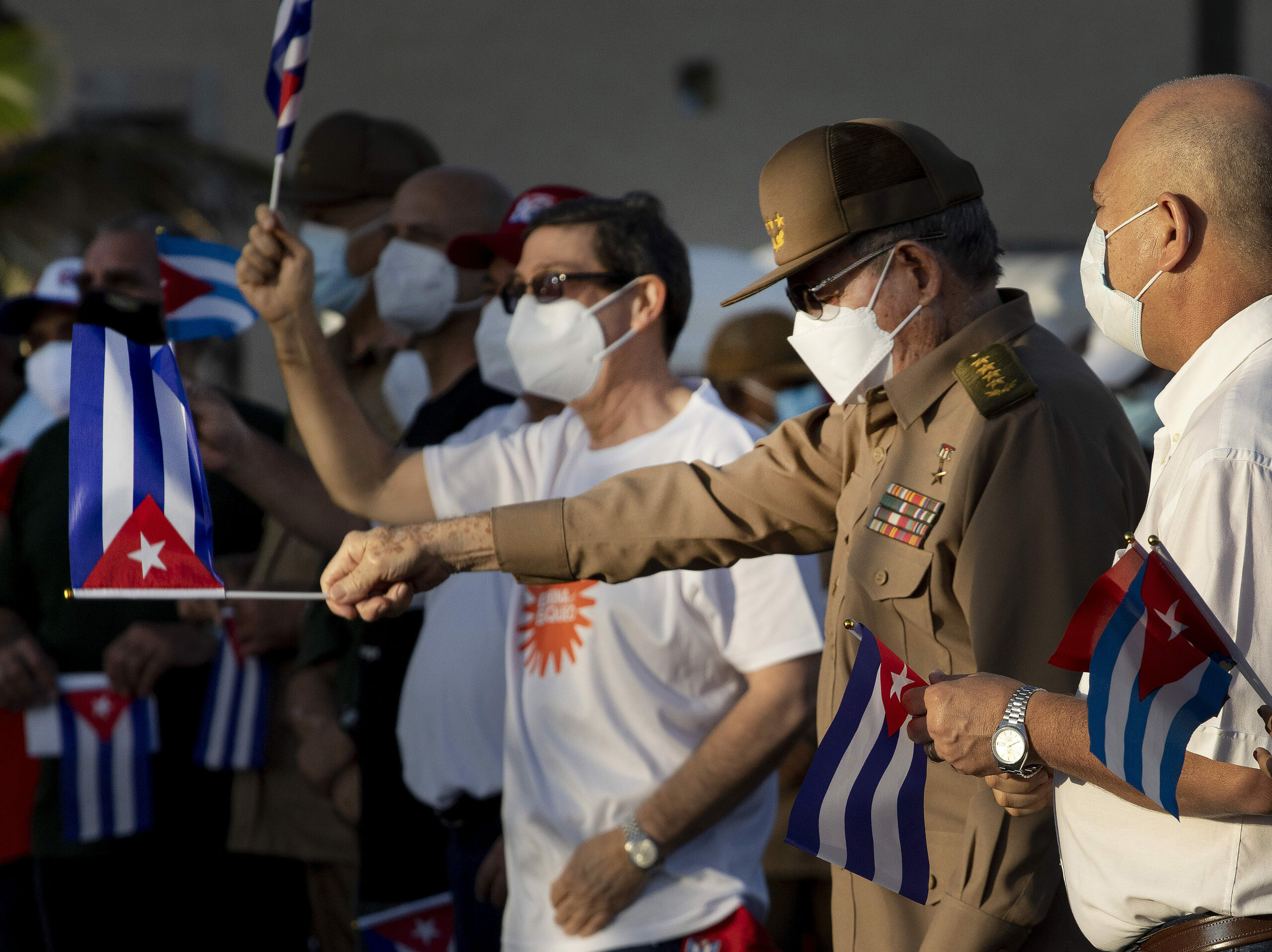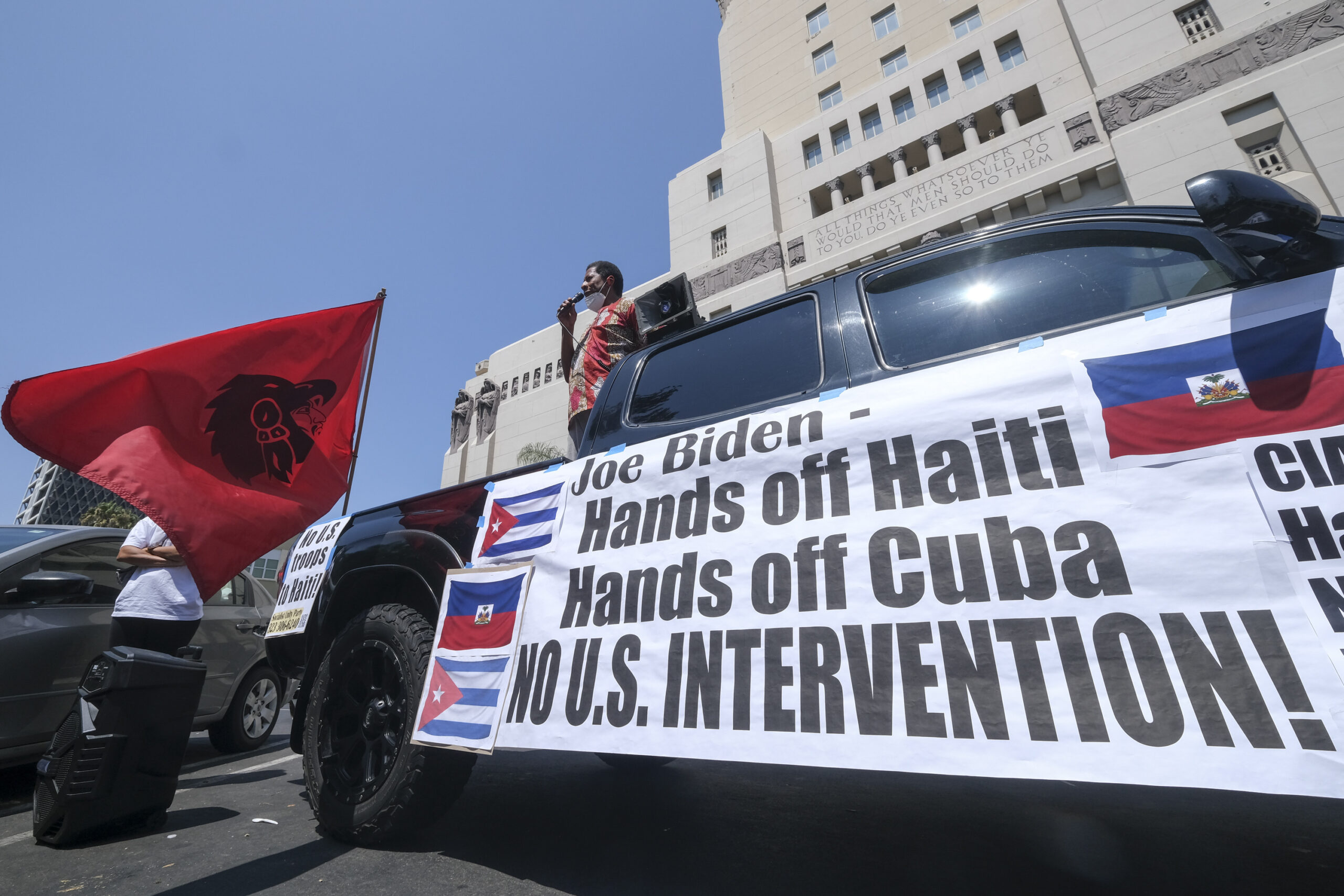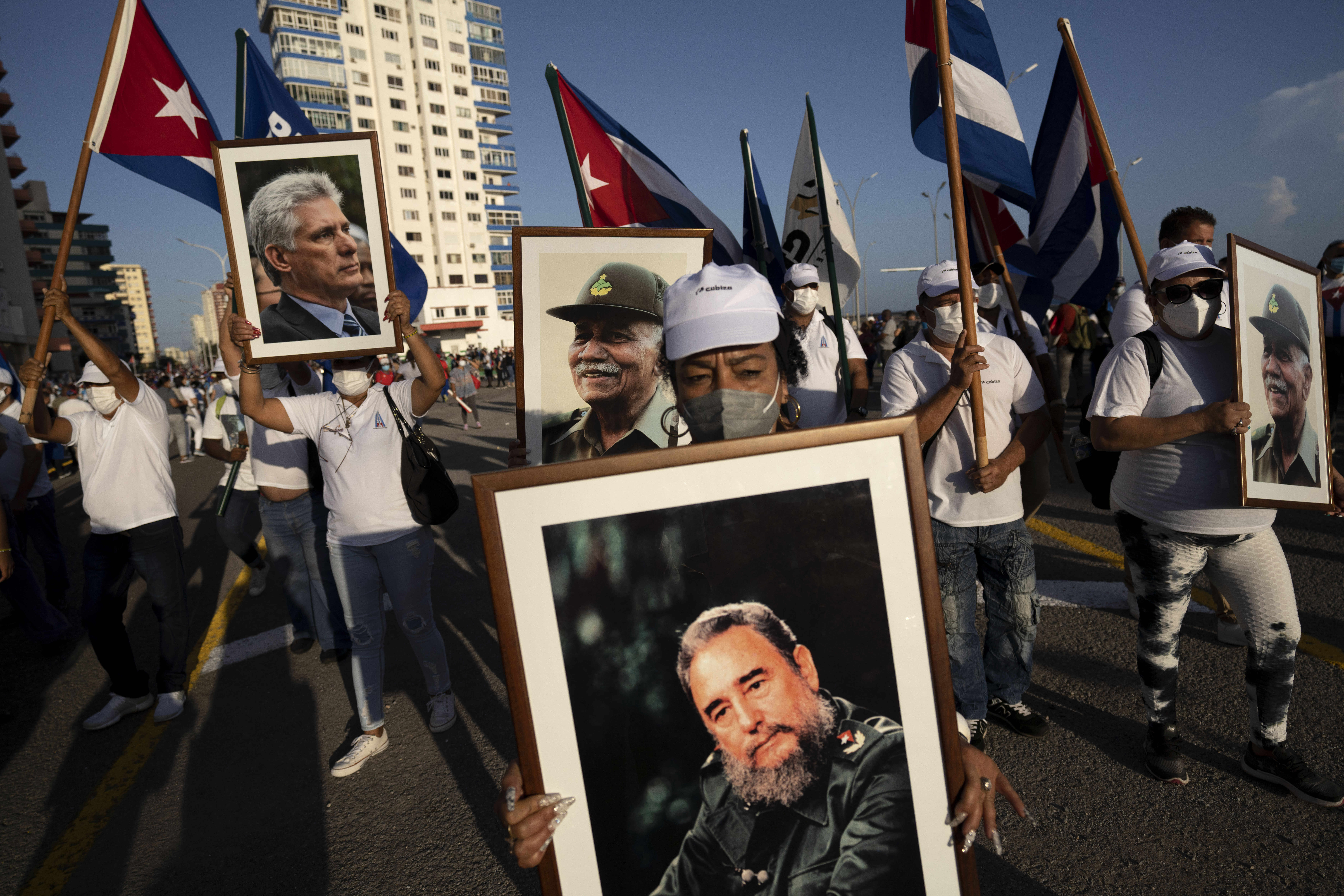Much of the world took notice when thousands of Cubans began demonstrations in Havana, and other cities, towns and villages to protest severe shortages of flour, bread, sugar, other basic items and the scarcity medicine and vaccines to combat an alarming increase in Covid-19 cases.
But discontent has been brewing at least since last year when rappers, artists and creative were protesting for artistic freedom. With the July 11 protests, before the Cuban government blocked Internet access, viewers and listeners saw and heard sometimes violent altercations between police officers and protestors, skirmishes between pro- and anti-government crowds and demonstrators expressing their anger and frustration at not being able to get enough food for themselves and their families, struggling to make ends meet and demanding an end to communism.
A Cuban woman, who fled the island nation in 2006 in search of a better life, said Cubans have been suffering for quite some time and recently, that pain and anguish continued to get worse.
“It’s a humanitarian crisis,” said the woman, who spoke on condition of anonymity. “Tourists from Russia, India and elsewhere brought in the variant and people are dying. Hospitals are collapsing, they are overflowing with sick people and there’s no beds and no medicine. There are not enough coffins and not enough vaccines for 11 million people. Pfizer offered the Cuban government their vaccine, but they refused.”
The woman, whose parents and four siblings still live in Havana, said it was not uncommon for Cubans to routinely line up for hours at government-run grocery stores as early as 5 a.m. Often, food is rationed, unavailable or unaffordable for ordinary Cubans which is why she buys food from an agency which delivers it to her family. Being that close to people for such extended periods of time during the pandemic is also causing coronavirus to spread, she said.
Cuba has developed its own vaccines and therapies to fight Covid-19. For much of 2020, Cuba kept COVID numbers at incredibly low levels, some days reporting only one or two cases, reported NPR. The virus only took off when Cuba reopened to tourists in November of last year, noted npr.org.
“I talked to my family on Sunday until they shut down the Internet at 7 p.m.,” the woman recalled. “People have been going out next to the U.S. embassy to get connected to the Internet. Am I surprised to see what’s going on? Siiiii!! (Yes!) I was very surprised. It started in a small town and spread all over the country. My family’s okay but they can’t leave the house because a few blocks have been cordoned off because everyone there is sick.”
She said she heard that 70 officers from a special unit and others in different branches of law enforcement said they were not going out on the road to arrest the sick and dying.
“Word is that they’re bringing in Venezuelan troops to crush protests because Cuban soldiers are refusing to fight the people,” the mother of one said of the Cuban government.
This was the first such explosion of dissent in Cuba since 1991, shortly after the collapse of the Soviet Union, leaving the population of 11 million people adrift as they endured extreme hardships during what Cubans called “the Special Period.” The Special Period marked an extended period of economic upheaval caused primarily by the dissolution of the Soviet Union and the Council for Economic Assistance, an economic coalition of Eastern bloc and socialist countries. Economists and other experts measured a 35 percent drop in Cuba’s gross domestic product, exports and imports shrank by more than 80 percent, and a slew of domestic industries closed or fell dormant.
Florida Sen. Marco Rubio and a succession of Republicans and Cuban emigrants in Florida and other parts of the U.S. are clamoring for U.S. intervention. Some are pushing President Joe Biden to send troops from Guantanamo Bay to protect Cubans who were marching against the government. Sen. Rubio introduced a resolution on July 15 “in support of the courageous Cuban people as they lead historic protests throughout the island against six decades of repression and tyranny from the Castro and Díaz-Canel regime.”
He rebuked the Cuban government as a dictatorship with “a long record of oppression against pro-democracy leaders, political opponents, and civic movements” and blamed the demonstrations on government repression not the economic blockade.
“Let’s be clear: food, medicine, and gas shortages are sadly nothing new in Cuba. The regime’s disastrous Covid response is the predictable result of a corrupt government,” he said in a release. “Instead of listening to America’s legacy media, we should take the protesters at their word. Cubans across the country are waving the American flag as a beacon of hope and chanting,
“Freedom!” and “Down with the dictatorship!” his statement continued.
“This is not just a response to the Covid outbreak, but an unambiguous rejection of six decades of suffering under totalitarian socialism and communism.”
President Miguel Díaz-Canel held a press conference where he told his supporters to fight the demonstrators.
“The order for combat has been given- to the streets revolutionaries!” he said.
According to media reports, President Diaz-Canel, blanketed by security, visited one of the protests just outside Havana where protesters screamed “down with the dictatorship!”
To which President Diaz-Canel responded: “In Cuba? What dictatorship?”
Poverty, struggle and U.S. interference
In several cities, counter protesters arrived to aid the police, shouting “Viva, Fidel!” Several government sources claimed the protesters were paid, while the Cuban government newspaper, Granma, conceded that some well-meaning, yet misled Cubans were probably there as well.

James Counts Early, a political activist, commentator and member of the Network in Defense of Humanity-USA, said it is a very dangerous time for the Cuban nation.
“It’s a tragic irony that Cuba has two vaccines but no way to distribute them. The embargo and sanctions are cruel and immoral,” he said. “The U.S. forbids third-person transactions. So, with the pandemic, the blockade of trading, and a corrupt policy, you have a very explosive situation.”
Mr. Early, a former director of cultural studies and communication at the Center for Folklife Programs and Cultural Studies at the Smithsonian Institution, said he is quite concerned about how much things will deteriorate.
“It’s a dangerous moment but we’ve seen the historical precedent. Cuba will protect its sovereignty, its territory and its integrity,” he said. “People have been called out to push back against the opponents of the government. It’s a signal to the U.S. that the government will not be patient with those seeking to undermine it.”
Activists who have been working for years to pressure the United States to end its 61-year embargo on Cuba are clear of the reasons why Cuba is in such dire straits.
Cheryl LaBash, a Cuba solidarity activist and a co-chair of the National Network on Cuba, said almost from day 1, former President Donald Trump added new sanctions regimes to an already overburdened country and economy.
“We saw Trump six months after he came into office go to Miami and make a speech against Cuba then proceeded to institute 243 new sanctions and put Cuba on the terror list,” said Ms. LaBash, a frequent visitor to Cuba. “To do this after the U.S. terror against Cuba is unconscionable. This was salt in the wound, adding insult to injury and a lying misrepresentation.”
“I know that what Trump did exceeds anything placed on Cuba and he and the U.S. have no compunction about the effect of the sanctions on the health and medical needs of the Cuban people.”
Ms. LaBash and filmmaker Catherine Murphy said the economy was already teetering and the piling on of new sanctions by the U.S. amid a pandemic proved to be the tipping point.
“This is the intended result of what U.S. policy has been trying to have happen for the past 60 years,” Ms. Murphy said with barely disguised anger. “Cuba is in this crisis because of the increased danger and mounting harm of coronavirus. The embargo and increased sanctions is so cruel, so cruel, f***ed up. The sanctions are affecting Cubans at the macro and family level. When Trump closed down Western Union it really affected people’s ability to live,” she explained.
“The country has been a tinder box for months. The solidarity people have been calling for a principled end to the blockade,” said Ms. Murphy, who studied in Havana during the 1990s and Cuba’s Special Period. “It’s a starving country, people’s lives are destroyed, and they can’t take it anymore after 60 years of this cruelty.”
The Trump administration expanded its economic war in 2019 against Cuba by imposing an oil blockade; placing a cap on remittances and enforcing severe restrictions on flights to Cuba; levying fines against banks, Western Union and other financial institutions to limit financial transactions; blocking the Cuban government from procuring commodities for the populace; and enacting sanctions, fines while bullying countries and companies seeking to do business with Cuba.
Cuba’s Minister of Foreign Affairs Bruno Rodriguez said in 2019 that the Trump administration has “aggressively intensified” implementation of the embargo against other countries and had tried to prevent the arrival of shipments to Cuba “by resorting to sanctions and threats against vessels, shipping companies and insurance companies.”
“It does not conceal its intention which is economically to suffocate Cuba and to increase damage, scarcities and hardships on our people,” he said. “… The United States government does not have the slightest moral authority to criticize Cuba or any other country when it comes to human rights,” he said.
Student Minister Abel Muhammad said the suddenness of the protests and other factors surrounding it suggest an organized effort by forces outside of Cuba.
“It has been orchestrated by those who’ve been thrown out and Israel with one of the biggest supporters of the blockade in the United Nations,” said Min. Muhammad, who has been the Nation of Islam’s Latino representative since 2005 and who lived in Cuba for about three months in 1995. “The Cuban people have a very powerful and profound nationalism. They are very educated, well read and not easily deceived. They have been dealing with a blockade, an inability to trade or get food. They have endured six decades of this economic blockade,” he said.
Min. Muhammad said, the Cuban people have had to endure a lack of resources, a lack of opportunity and the ability to voice dissent. He said, no one and nothing is above critique and recalled Cubans not being shy about expressing their opinions and even critiquing the late President Fidel Castro. He said, he hopes the unrest will provide an opening for atonement and for all concerned to have a robust dialogue.
Continued demands to lift sanctions
Sen. Rubio went after the Black Lives Matter (BLM) movement for pointing out the injurious and destructive effects of the economic blockade of Cuba’s ability to exist.
“Black Lives Matter condemns the U.S. federal government’s inhumane treatment of Cubans and urged it to immediately lift the economic embargo,” the BLM statement said. “This cruel and inhumane policy, instituted with the explicit intention of destabilizing the country and undermining Cubans’ right to choose their own government, is at the heart of Cuba’s current crisis. Since 1962, the United States has forced pain and suffering on the people of Cuba by cutting off food, medicine and supplies, costing the tiny island nation an estimated $130 billion.”
BLM also praised Cuba for working offering Assata Shakur asylum and for standing with and supporting freedom fighters and their Black revolutionary comrades in South Africa, Mozambique, Guinea Bissau and Angola.
Sen. Rubio, who was born in Miami to Cuban parents who fled Cuba in 1956, was quick to condemn BLM. “The extortionist ring known as the Black Lives Matter organization took a break today from shaking down corporations for millions & buying themselves mansions to share their support for the Communist regime in #Cuba,” he tweeted.
“My office stands ready to help the leaders of the Black Lives Matter organization emigrate to #Cuba,” he said in another tweet.

Cuban government officials, Cuba watchers and activists say the embargo and sanctions have affected every part of Cuba. The rollout of Cuba’s vaccine was delayed because U.S. sanctions prevented raw materials from being imported, according to the Cuban government. Even now, as Covid cases in Cuba skyrocket to their highest levels since the pandemic began, and in his first six months in office, President Joe Biden has made no attempt to lift the sanctions.
“The Biden-Harris administration has broken its promise to normalize relations with Cuba. They have continued Trump’s strictures and pushed the people towards rebellion,” said Mr. Early.
“Democrats and Republicans have wanted regime change although their strategic and tactical approaches are different. Obama wanted regime change but realized that the blockade alone wouldn’t achieve that so he pursued normalization and resumption and widening of commercial ties,” he explained. “The U.S. position is not to have a socialist country in this hemisphere.”
Ms. Murphy said the plan concocted by the U.S. appears to be working.
Ms. Murphy, an activist and educator—best known for her documentary film MAESTRA about the 1961 Cuban Literacy Campaign—said the country has been a tinderbox for months.
“Cubans couldn’t send money then when Covid hit tourism evaporated and cottage industries like family-run restaurants and renting rooms disappeared,” said Ms. Murphy whose grandmother and great-aunt lived in Cuba at the turn of the last century. “If the U.S. was really concerned with the needs of the human beings in Cuba, in the context of a global pandemic, why not open one avenue to allow revenue to come in? At the minimum, the U.S. should allow family remittances. If they re-instated family remittances, a lot could change, be improved.”
“Covid is raging in Cuba right now. People want to eat, take care of their families, pay their light bills, their water bills. Mix these things with the U.S.’ genocidal policies and that is the recipe going on right now.”
Ms. LaBash agreed. “It was surgically determined where Cuba gets its income such as remittances. Any avenue that Cuba might have to provide relief for its people was closed,” said Ms. LaBash, herself a regular visitor to Cuba. “… I think they decided to make Cuba an example of how to defeat socialism.”
Ms. LaBash said, she and her fellow activists expected President Biden to follow through on his campaign promise to normalize relations with Cuba and they were preparing to push him further towards ending the embargo.
“Biden is no Obama. You see the image and the shadow he casts is Trump,” she said with disgust. “We’re going into July without even a modicum of change in the policy. Visas used to be processed in Havana instead of sending them to a third country and then being denied.
They have to pay to travel, pay for the visa and 90 percent of applications are denied. The U.S. has put so many restrictions on trade such as companies having to verify the end-user in Cuba. There is a family from Canada who owns a company which has ignored the U.S. sanctions and they are not allowed to enter the U.S.,” she said. “The U.S. is using starvation as a weapon and cautioning the Cuban government not to use violence.













